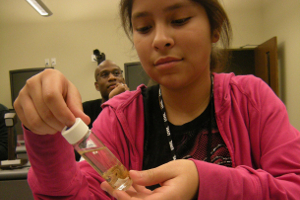Fellowships provide students (generally post-graduate) an opportunity to apply the technologies, methods and practices related to their field of expertise in a professional environment. The fellow is assigned to a particular project, with some assignments lasting as long as two years. The Hygienic Lab participates in several fellowship programs sponsored by the Association of Public Health Laboratories and the Centers for Disease Control and Prevention.
Emerging Infectious Diseases Fellowship Program
The Emerging Infectious Diseases Laboratory Fellowship Program, sponsored by APHL and CDC, trains and prepares scientists for careers in public health laboratories and supports public health initiatives related to infectious disease research.
Environmental Public Health Laboratory Fellowship Program
The EPH Laboratory Fellowship Program aims to attract and prepare laboratory scientists for careers in environmental public health.
Public Health Associate Program
The Public Health Associate Program is a competitive, two-year paid training program with the Centers for Disease Control and Prevention. PHAP associates are assigned to public health agencies or nongovernmental organizations and work alongside other professionals across a variety of public health settings. After completing the program, PHAP graduates are qualified to apply for jobs with public health agencies and organizations.
Bioinformatics in Public Health Fellowship Program
The Bioinformatics in Public Health Fellowship Program trains and prepares students to apply their expertise and design tools to aid public health personnel in the use of bioinformatics. BPH fellows analyze genetic data that is generated through molecular sequencing techniques to solve public health problems. In the fellowship’s current form, fellows will be paired with a complimentary CDC infectious disease laboratory.



